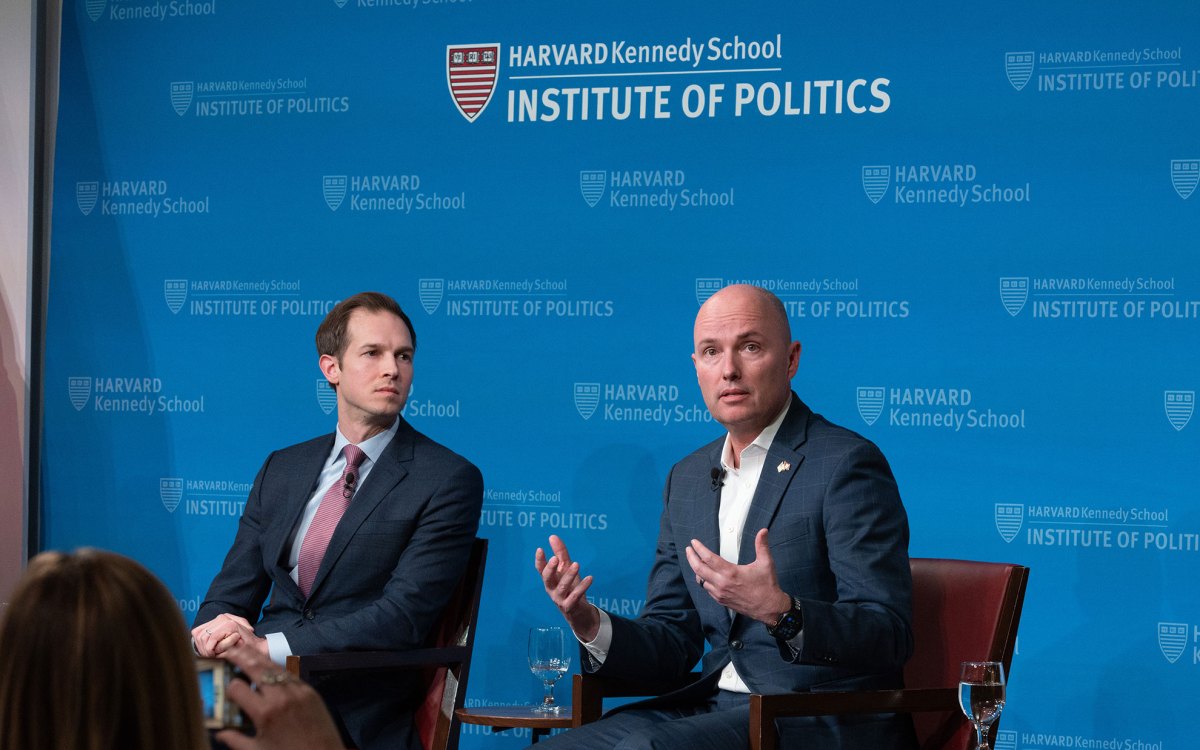
Harvard and MIT announced edX, a joint venture that builds on MITx and Harvard distance learning. Making the announcement were MIT Provost L. Rafael Reif (from left), MIT President Susan Hockfield, Harvard President Drew Faust, MIT’s Anant Agarwal, and Harvard Provost Alan Garber.
Stephanie Mitchell/Harvard Staff Photographer
Educating Harvard, MIT — and the world
EdX platform will enhance classroom experience, build on distance learning initiatives, leaders say
Every year, bright students around the world dream of a chance to debate ideas in a Harvard classroom or conduct experiments in an MIT laboratory — an opportunity to learn from some of the greatest minds in fields from the humanities to engineering to the social sciences.
Soon, as leaders of both universities announced today, all an eager student will need is a modem and a mouse.
EdX, a new online education platform, will draw on the faculty, research, and institutional backing of both universities to provide Harvard and Massachusetts Institute of Technology (MIT) courses to users around the world. The partnership will not only build on both universities’ ongoing work in online education, but will provide a treasure trove of data on how students learn and how to teach them most effectively.
“We will not only make knowledge more available, we will learn more about learning,” said Harvard President Drew Faust during a press conference at the Hyatt Regency Cambridge.
In developing edX, which will offer its first courses under the Harvardx and MITx brands this fall, the universities hope both to advance online learning and to apply its tools to enhance education in the classroom.
“Two of my most important commitments as Harvard president have been to increase access to education and to strengthen teaching and learning,” Faust said. “EdX will enable us to advance both those purposes in ways we could not previously have imagined.”
Harvard and MIT, longtime neighbors and occasional rivals, came together around the issue of online education, inspired by informal talks between Harvard Provost Alan Garber and MIT Provost L. Rafael Reif.
The universities share a philosophy on how to embrace technological change, said MIT President Susan Hockfield.
“Today in higher education generally, you can choose to view this era as one of threatening change and unsettling volatility, or you can see it as a moment charged with the most exciting possibilities for education leaders in our lifetimes,” Hockfield said. “Online education is not an enemy of residential education, but rather a profoundly liberating and inspiring ally.”
Harvard and MIT have each committed to raising $30 million through institutional support, grants, and philanthropy to fund the global venture. Eventually, they hope to invite other universities to offer courses under their own brands on the edX platform. (All edX software will be open source to allow other universities to develop their own versions as they wish.)
Anyone will be able to register for a Harvardx or MITx course, and will be graded. For a small fee, any student who completes and passes a course can receive a certificate of mastery in the subject.
The project will allow Harvard faculty to contribute directly to the broader discussion of technology’s role in higher education, said Dean Michael D. Smith of the Faculty of Arts and Sciences, who has been involved in edX’s development.
“I view edX as a laboratory where individual faculty can get support to experiment with the development of tools, content, and pedagogical approaches that they want to use in our campus-based courses,” Smith said.
If the universities’ current online offerings are any indication, demand for the edX courses will be strong. MITx’s pilot course, “Circuits & Electronics,” registered 120,000 users when it started earlier this year. Though Harvardx has not launched any classes, existing online courses, such as Michael Sandel’s “Justice,” have proven wildly popular.
“These online tools give us measurement capabilities that we’ve never had before,” said Garber, adding that the University’s existing online education programs, such as Harvard Extension School distance education offerings and the Harvard Business School Executive Education programming, would continue, separate from edX. “This is about experimentation, about research, about rethinking education.”
Already, data from the project is rolling in, said Anant Agarwal, director of the Computer Science and Artificial Intelligence Laboratory at MIT, who has headed development of the MITx platform and who will serve as edX’s first president.
For instance, edX developers can track how long students spend working on an exercise or watching a short lecture video to see which tasks or lessons require more fine-tuned learning. Students in a course could be given one of two tests to see which measured learning better.
With thousands of students enrolled, an edX course can provide reams of “statistically significant data in a very short amount of time,” Agarwal said. “All of this data would be available to researchers at MIT, Harvard, and other [universities] around the world.”
The partnership marks “a transformative moment” for MIT and Harvard, and an exciting time for faculty and students, said Harvard College Dean Evelynn M. Hammonds, who is also Barbara Gutmann Rosenkrantz Professor of the History of Science and of African and African American Studies.
“We’ll find out what students want, what faculty want, what works, what doesn’t work,” said Hammonds, who was in the audience on Wednesday. “I think that’s the exciting part, the opportunity for that kind of engagement.”




